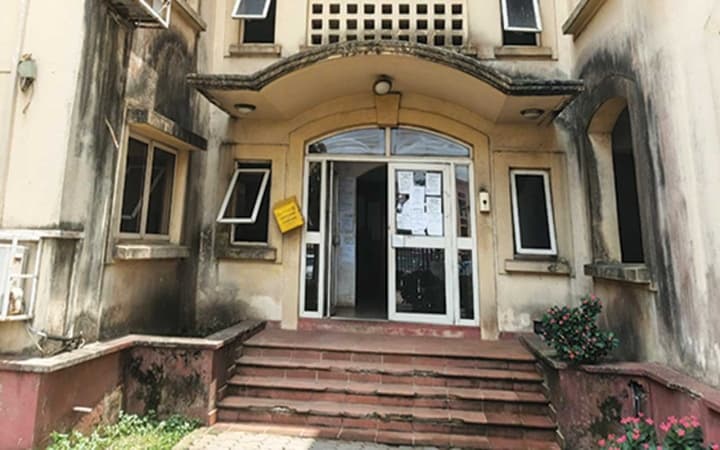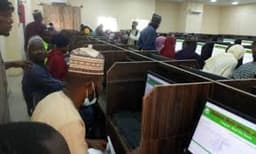
A dilapidated court building
From leaky roofs to overcrowded halls and collapsing courtrooms, Nigeria’s courts are fast becoming symbols of neglect rather than sanctuaries of justice.
Across the federation, judges share courtrooms amid erratic power supply while litigants wade through flooded corridors to seek justice. Despite repeated promises, underfunding and executive interference continue to cripple the third arm of government. YETUNDE AYOBAMI OJO reports that years of decay have eroded public confidence in the judiciary, pointing out that full financial autonomy may be the only hope to restore the dignity of Nigeria’s temples of justice.
A few years before he retired from service, Justice Adeniyi Onigbanjo was carrying out his duty in one of the courthouses at the Ikeja High Court Complex, Lagos State, when a power outage suddenly occurred.
The matter on the floor was a scheduled further hearing in the alleged N979.6 million fuel subsidy fraud suit, filed by the Economic and Financial Crimes Commission (EFCC) against Seun Ogunbambo, Habila Theck, and their company, Fargo Energy Limited.
As darkness descended upon the courtroom, Onigbanjo, unwilling to stall proceedings due to the outage, reached for a torchlight, and the proceedings continued for about 10 minutes before he adjourned all cases before him, citing the failure to restore the power supply.
If anyone is awed by such an unfortunate spectacle in a Nigerian courtroom in the 21st Century, then such a person is in for even more shock as other forms of odd spectacles dot the sprawling Ikeja High Court Complex, which houses 12 courtrooms, judges’ chambers, registrars’ offices, and secretarial spaces.
Over time, a greater part of this complex has fallen into a state of visible disrepair, which not only mirrors the country’s failing public infrastructure but also tells a disturbing story of neglect and decay in public institutions, including the judiciary.
The once-imposing Ikeja High Court Complex now looks tired, its walls discoloured, its ceilings caving in, and its air thick with dampness and dust. The walls, originally cream and smooth, are now streaked with mucus-like patches of mould, dirt, and water stains. In many parts, paint peels off in large flakes, exposing rough concrete beneath.
In some of the courtrooms and walkways, ceiling boards sag dangerously, with water marks induced by years of water leakage from the corroded roof imprinting queer designs on the hitherto white ceiling boards.
In some registrars’ offices, sections of the roof have collapsed, forcing staff to place buckets beneath the leaks during rainfall. The roof sheets, rusted and warped, no longer provide adequate shelter.
On the floor, the situation is even worse. Swathes of courthouses and their corridors are replete with cracked and broken tiles, which add to the unsafe conditions that litigants, jurists and other stakeholders have to contend with daily.
Though some of the courtrooms have been renovated, repainted, and refurnished, they somehow still look irritating, with broken chairs that could easily harbour bedbugs and sundry irritants despoiling the ambience.
Aside from that, the lighting system is almost non-existent. Many fluorescent bulbs and fittings in the complex have been removed or damaged, leaving courtrooms and hallways in perpetual gloom. Open electricity chambers, which expose tangled cables and live wires, pose a serious electrical hazard to court goers, while wall sockets hang loosely, some scorched or blackened by short circuits.
With the absence of proper ventilation in some situations, the air inside these temples of justice is akin to what obtains in street kiosks – stale and suffocating, especially in packed courtrooms.
The gross inadequacy of appurtenances in the complex finds expression in the conversion of entrances to some restrooms into makeshift pantries or storage spaces, where old and broken furniture, discarded files, and rusted air conditioners are recklessly strewn.
Toilet facilities are barely functional in a number of them, while broken doors, rusted window frames, mangled window and door panes, leaky taps, foul odours complete the ugly spectacle presented by what is supposed to constitute conveniences in the complex.
As most corners of the Ikeja High Court Complex speak of slow erosion of the judiciary’s dignity, and years of institutional neglect, thereby mirroring abandoned relics that are struggling to function, the situation at the Roseline Omotosho Courthouse, which houses the Lagos Special Offences and Sexual Violence court.
Here, many times, when there is a power outage, senior lawyers appeal to the judge to allow them to remove their wigs and gowns pending the restoration of light.
Still in Lagos, once the country’s judicial pride, the irony looms even larger. At the Federal High Court, Ikoyi, known among lawyers as waterside, files are piled so high that they form walls. Lawyers squeeze into overcrowded rooms, sweating as fans whir weakly or not at all. Wooden benches creak routinely as the air smells of sweat and paper.
Registrars sit boxed in by mountains of case files that threaten to topple over. In some cases, the rooms are so small that they cannot accommodate all lawyers in attendance, litigants and the press. During court sessions, human beings mill around the doors and windows in an attempt to hear proceedings.
The Federal High Court Annexe, Ikoyi, which houses the new court structure, appears promising, but it seems that the edifice is yet to be completed, years after construction started.
The Igbosere High Court, Nigeria’s oldest colonial-era court, was razed during the 2020 EndSARS protests. Five years on, it remains an empty lot. Nearby police stations have long been rebuilt, but Igbosere’s reconstruction drags endlessly. Judges displaced by the fire still share courtrooms, alternating sittings like tenants in a congested apartment.
To its credit, the Lagos judiciary under Chief Judge Kazeem Alogba has expanded court divisions across Eti-Osa, Yaba, Surulere, Amuwo Odofin, Festac, Ikorodu, Badagry, and Epe, and built modern facilities like libraries, toilets, e-filing, and virtual hearing systems. But these gains highlight an uncomfortable contrast with the decrepit conditions in many other parts of the country. These facilities are still grossly inadequate. For instance, some of the courtrooms in the Lagos High Court, Yaba, are Spartan and unable to accommodate scores of people.
Depressingly familiar scenes across country suggest unchanged situations
Once revered as the nation’s moral compass, Nigeria’s judiciary- the so-called last hope of the common man now stands as a haunting reflection of institutional neglect. From leaking roofs in Ondo to collapsed buildings in Ekiti and overcrowded, sweltering courtrooms in Lagos, the physical decay of the courts mirrors a deeper crisis of confidence and independence.
Underfunded, politically constrained, and structurally weakened, the judiciary’s decline raises urgent questions about Nigeria’s commitment to the rule of law and democratic governance.
On a grey morning in June 2025, rain hammered the rusty roof of High Court 1 in Ondo Judicial Division until the roof gave way. Water streamed onto the judge’s bench, soaking wigs, robes, and files until the courtroom smelt of wet wood and damp paper.
As the sky emptied its bowels, lawyers scrambled for safety, abandoning their tables for the gallery. Litigants huddled in corners, clutching their documents like refugees of justice.
A concerned Nigerian captured the chaos on a mobile phone, and the 47-second clip, which was uploaded online, became a national metaphor: a courtroom literally drowning under the weight of neglect. For a moment, justice itself appeared defenceless, soaked, humiliated, and stranded.
The Ondo video was shocking, but it was not new. From one state to another, the story is depressingly familiar: broken chairs, cracked walls, unpainted courtrooms, and power outages that halt proceedings mid-session.
Further West, in Ekiti State, tragedy almost struck when part of the state High Court complex collapsed in July 2023. The then Chief Judge, Justice Oyewole Adeyeye, sustained injuries. He was later flown abroad for treatment, but never fully recovered. Months later, he died, and his passing became a grim punctuation mark on the story of judicial neglect.
In Imo State, panic swept through the Federal High Court, Owerri, in January this year when the building began to vibrate during a session. Lawyers and judges fled for their lives. The structure built under former Governor Rochas Okorocha had long been suspected of structural defects. The Nigerian Bar Association (NBA) promptly suspended court activities, calling for safety inspections.
Each of these incidents underlines a larger truth: Nigeria’s temples of justice are crumbling.
Across the federation, the story repeats with minor variations but identical themes. In Delta State, lawyers donate furniture and repair leaking roofs. In Kwara, a magistrate’s court lost its roof and now operates under a tree in what locals call “the forest court.” In Ogun State, the newly commissioned Abeokuta complex has modern facilities, but the courts outside the state capital, such as those in Ilaro and Igbesa, remain in disrepair, with bushy compounds, worn-out furniture, and poor drainage. Water seeps through broken floors.
In the North, insecurity adds another layer of decay. In Borno, Boko Haram’s onslaught razed several courts and police stations. Though some have been rebuilt in Maiduguri, 24 local councils still lack functional courts. In Katsina, only five divisional courts boast usable facilities; most lower courts operate without power, microphones, or toilets. Justice, in these places, is a daily improvisation.
Persistent, systemic weakening of a strong institution
The current crisis in the judiciary did not emerge overnight; rather, it is the culmination of decades of systemic neglect that began in the years after independence.
Nigeria’s early postcolonial judiciary inherited a modest but functioning infrastructure. By the late 1970s, regional courts were adequately maintained, and judicial officers commanded respect. The oil boom years saw the construction of iconic courts in Lagos, Ibadan, and Kaduna.
But the military era changed everything. Military governors, ruling by decrees, subjected the judiciary to executive control. Budgets were centralized; judicial independence was suffocated. By the time democracy returned in 1999, the damage was deep.
Even though the 1999 Constitution (as amended) enshrines judicial autonomy, implementation has been half-hearted as state governors retain power over judicial finances, and court buildings age without renovation.
As the judiciary remains trapped between constitutional promise and political manipulation, the fragile institution remains starved of funds but burdened with public expectation.
Numbers tell part of the story. In the 2024 national budget, only N5.3 billion was earmarked for judicial capital projects, and N8.8 billion for recurrent expenditure. This amount is barely enough to maintain the Supreme Court and federal high courts, let alone the states. In contrast, tens of billions were allocated to refurbish executive offices and legislative complexes.
For 2025, even with a N54.99 trillion national budget, judicial allocations remain stagnant. The National Judicial Council (NJC) must ration funds, often leaving lower courts to fend for themselves.
“The judiciary is treated as a footnote in governance,” said a senior registrar in Abuja, who asked not to be named. “Even when money is approved, release is delayed. We beg for what is constitutionally ours.”
Behind these statistics are stories of endurance. In an unventilated magistrate’s court in Delta, the presiding officer fans herself with case files as flies hover over the bench. “We work under unbearable heat,” she said, smiling wearily. “But justice cannot wait for electricity.”
These vignettes reveal a quiet heroism – judicial officers striving to maintain order amid decay. But they also expose the cost of neglect on morale and professionalism.
Independence without real financial autonomy keeps judiciary in chains
Financial autonomy remains the judiciary’s most elusive promise. Though the Constitution guarantees it, governors control disbursement. Executive Order 10, signed by President Muhammadu Buhari in 2020 to enforce financial independence, met resistance from state governments and fizzled in implementation.
Lagos-based lawyer, Ade Tunji Akinyemi, believes that autonomy is not a privilege but a necessity. “A judiciary that depends on the executive for its budget is a captive institution. You cannot be independent when you must beg for your own salary,” he said.
According to him, the executive arm cannot adequately address the challenges of the judiciary because it lacks technical grounding in law. “Just as it takes a pilot to fly a plane, only a legal mind can properly appreciate and provide solutions to legal challenges,” he explained.
He added that the head of the executive cannot prioritize the welfare of judicial staff the way the head of the judiciary would, stressing that the importance of the judiciary in nation-building cannot be undermined.
Tunji maintained that the only sustainable solution is to grant the judiciary full independence to manage its own affairs.
Indeed, without autonomy, the judiciary cannot plan long-term or maintain its infrastructure. Court projects stall midway; staff welfare remains poor; innovation stagnates.
Expectedly, this high-level dependency has birthed another disturbing practice: governors “gifting” cars, houses, and allowances to judges. The Nigerian Bar Association (NBA) President, Afam Osigwe (SAN), described it as “demeaning.
“It is shameful for judges to depend on governors’ goodwill. Such gestures compromise perception and erode confidence. A judge should never be in a position where the public wonders whether his decision is repayment for a gift.
It is often annoying to see some governors boast, saying, ‘I gave cars to my judges,’ or staging public ceremonies to present such gifts. This is demeaning.
The judiciary must not be reduced to a point where its members appear to be receiving handouts as though a favour is being done,” Osigwe emphasized.
He noted that even when judges strive to remain independent, the perception of executive influence remains difficult to erase. “There will always be the impression that the judiciary is at the beck and call of the executive; otherwise, those handouts would not be necessary,” he added.
The NBA president urged that all judicial expenditures be captured in government budgets and executed by judicial professionals. “No one should argue that funds will be embezzled or mismanaged because that is why qualified personnel exist within the judiciary to oversee resources,” he emphasized.
Osigwe further condemned situations where judges are compelled to repeatedly approach governors for financial releases, saying such dependency undermines dignity and judicial confidence. He commended the federal judiciary for avoiding such pitfalls and urged state governments to urgently adopt similar practices. “Justice is rooted in confidence. Once that confidence is eroded, the public’s faith in the judiciary is permanently weakened,” he warned.
Beyond optics, this culture of benevolence fosters subtle control. Judges who resist political pressure risk delayed benefits or withheld funding, and the independence of the bench becomes a mirage.
Justice sector reform as sine qua non for impartial, brave judiciary
In April 2024, President Bola Ahmed Tinubu convened a Justice Sector Reform Summit in Abuja. It brought together all three arms of government – a rare show of unity. Tinubu called for “a justice system that guarantees fairness, efficiency, and dignity.” The summit endorsed several resolutions: constitutional validation of virtual hearings; verbatim recording of court proceedings; and measures to accelerate trial timelines. It was a bold step, but progress since then has been slow.
Many courts lack the basic infrastructure – electricity, Internet, or recording devices to implement these reforms. In most state courts, proceedings still rely on manual shorthand, a relic of the colonial era. “We have fine recommendations, but no budget to make them real,” said a judge who attended the summit.
Nigeria’s weak judiciary undermines its economy. Its consequences ripple through every sector. Investors fear uncertain dispute resolution; human rights cases drag for years; corruption thrives in the shadows of delay. “Justice delayed is not just denied – it’s disbelieved,” said human rights lawyer, Femi Falana (SAN).
“When citizens lose faith in the courts, they turn to self-help or violence. That’s how societies unravel.”
Contract enforcement takes years, and commercial disputes languish in procedural limbo. The World Bank’s Doing Business Index repeatedly cites judicial inefficiency as a barrier to investment. Even democracy itself suffers. “When courts cannot check executive excesses, impunity flourishes. And our courts are collapsing—physically and morally.
The strength of any democracy is measured not by its elections, but by its courts,” said a constitutional scholar, Professor Akin Oyebode.
But behind structural decay lies human despair. Judges are overworked and underpaid. Security is poor; several have been attacked or kidnapped in recent years. Some magistrates rent private accommodation because their official quarters are uninhabitable. A retired judge in Kaduna recalled being assigned an official car that broke down within months. “We were supposed to deliver justice, but we could not even drive to court. You start to understand why corruption creeps in – it becomes survival,” he said.
Low morale erodes discipline. Young lawyers avoid judicial appointments, preferring private practice. Those who stay struggle with outdated tools – manual registers and failing computers.
“The judiciary is fighting 21st-century crime with 19th-century equipment,” said a Lagos-based prosecutor.
Technology as link between today, tomorrow
A few bright spots offer hope. Lagos, Rivers, and Abuja have adopted e-filing, digital case management, and virtual hearings. The pandemic accelerated innovation in some jurisdictions, showing what is possible when there is will.
But the digital divide remains vast. Many state courts lack reliable electricity, let alone Internet access. Without massive investment, the promise of technological reform will remain confined to a few urban centres.
Judicial officers also need training. “Technology cannot replace human integrity. We must build both infrastructure and capacity,” said a child rights advocate and convener of the Advocate for Children and Vulnerable Persons Network (ACVPN), Ebenezer Omajilile.
According to him, the judiciary’s financial overdependence on the Federal Government for bailouts, despite clear constitutional provisions for financial autonomy, has left it weak and vulnerable.
He added that pervasive corruption, poor planning, and incompetence have worsened the situation. The use of unqualified contractors, weak project management, and inadequate execution of judicial projects, he said, have led to abandoned or poorly delivered facilities.
“Across the country, we see white elephant projects in the judiciary. Even Lagos, which claims to be the Centre of Excellence, has allowed politics to infiltrate and politicize its judiciary,” Omajilile said.
He further identified macroeconomic instability as a barrier to progress, arguing that high inflation and interest rates discourage private financing for infrastructure, while excessive government borrowing crowds out private investment in key sectors, including the judiciary.
Restoring dignity, charting way forward
Stakeholders are unanimous in their submission that the enforcement of full financial autonomy through legislation and oversight, the establishment of a National Judicial Infrastructure Fund managed independently of the executive, and the adoption of transparent budgeting with public reporting to curb corruption all constitute the way forward.
Others include improving welfare and security for judicial officers and digitizing court operations nationwide to reduce backlog and enhance transparency. But beyond policy, experts emphasized a cultural shift. “We must rediscover respect for our institutions. A nation that neglects its courts destroys its conscience,” said Omajilile.
Despite the magnitude of challenges facing it, Lagos judiciary, led by Justice Alogba, appears poised to raise the bar in judicial excellence. Presently, it is transforming the historic Lagos High Court, Igbosere, which is Nigeria’s oldest court, into a world-class judicial complex equipped with modern facilities.
According to Alogba, the state is relentlessly pursuing a policy of easy access to justice, which will ensure that residents in distant communities no longer have to travel long distances to seek legal redress.
On judges and magistrates’ accommodation, another critical component of the Lagos judiciary’s reform, the CJ said that the judiciary is constructing duplexes, one- and two-bedroom apartments, and other housing units in designated judicial communities to provide safe and convenient accommodation for jurists.
Currently, two duplexes and 18 new housing units have been completed, while additional one and two-bedroom flats are being built to house judicial personnel working in areas such as Epe, Badagry, and Ikorodu.
“The aim is to make our judges and staff feel secure and close to their workplaces,” a source said. “They risk their lives daily travelling long distances on poor roads, and that should not be the case.”
At a conference in Abuja, a young magistrate from the North-East lamented: “When it rains, I stop sitting because my courtroom leaks. When there is no power, I adjourn. When the generator fails, I send everyone home. But I stay because I believe justice still matters.”
Her confession moved the hall to silence. It captured, more than any report could, the soul of a judiciary battling invisibility – an institution stripped of dignity yet clinging to duty.
Nigeria’s judiciary stands as both a mirror and a warning. Its cracked walls and leaking roofs reflect not only neglect of infrastructure but a corrosion of national values. A nation that cannot protect its judges cannot protect its people.
Restoring the temples of justice will require more than budgets or buildings; it will demand courage—the courage to grant autonomy, to fund integrity, and to believe once again that justice is sacred. Until then, every dripping roof will echo the same silent question: Who will judge the neglect of justice itself? (The Guardian)



























NEWS EXPRESS is Nigeria’s leading online newspaper. Published by Africa’s international award-winning journalist, Mr. Isaac Umunna, NEWS EXPRESS is Nigeria’s first truly professional online daily newspaper. It is published from Lagos, Nigeria’s economic and media hub, and has a provision for occasional special print editions. Thanks to our vast network of sources and dedicated team of professional journalists and contributors spread across Nigeria and overseas, NEWS EXPRESS has become synonymous with newsbreaks and exclusive stories from around the world.